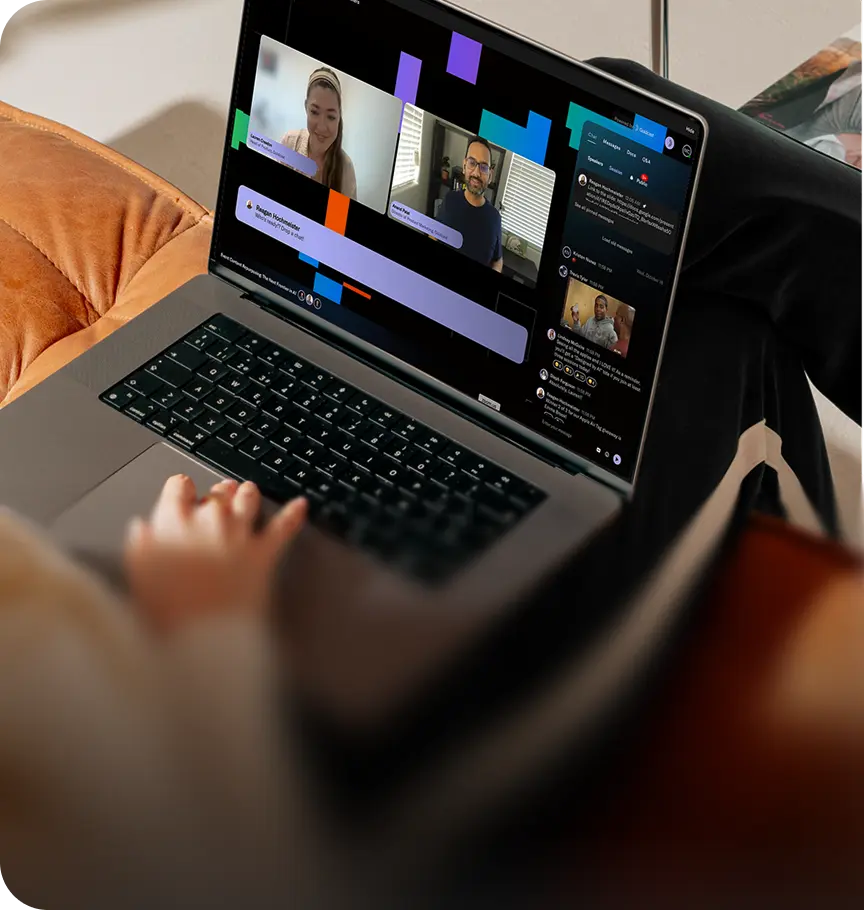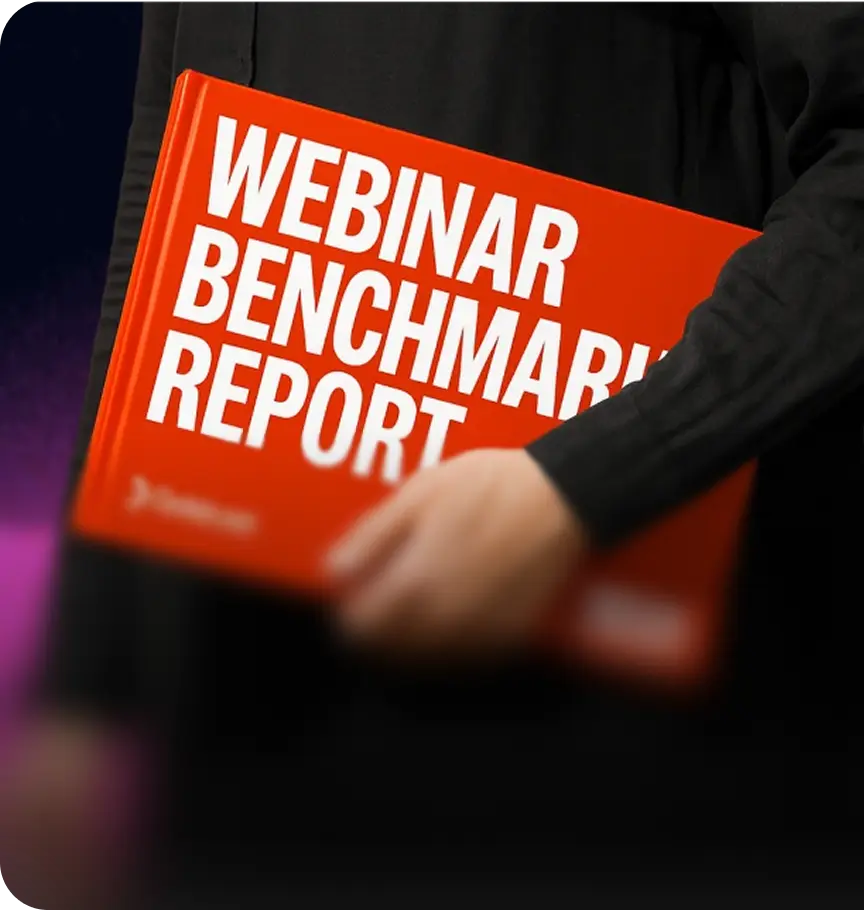Asking the Right Podcast Interview Questions (+ 40 Examples)

Table of Contents
Maximize Your Marketing ROI
Join 10,000 other marketers already getting the best tips on running engaging events that boost pipeline and create raving fans.
B2B audiences are looking to hear real, engaging, relatable conversations — which means as a podcast host, you're tasked with making that happen.
We're guessing you're here because you've discovered that coming up with engaging questions that also create a natural flow of conversation is harder than it seems! And the stakes are higher than ever, with 75% of B2B decision makers actively listening to podcasts.
Your job isn't to come up with tons of generic questions; you've got to create an entire experience for your audience, encourage your guests to share their expertise, and position your brand as a thoughtful industry leader. Ask the right questions, and the rest follows naturally, with your podcast recording becoming a powerful content multiplier.
In this guide, you'll find proven frameworks for crafting effective interview questions, plus 40 examples you can use for your next podcast interview. We'll also talk about how the right technology solution amplifies your reach and impact, ensuring you've got a successful podcast on your hands!
First things first: Prepping for your podcast interview
Pulling off a great interview starts long before you hit the record button. Don't skip over the foundational work! Put some thought into what you name your new podcast, come up with a list of potential topics you want to cover, and invest in a reliable, high-quality recording software like Goldcast Recording Studio for your business podcast.
When you're ready to try your hand at interviews, take these preliminary steps:
Choose your guest wisely
Even the best podcast interview questions can't coax a great story out of a poorly chosen guest. Start by looking at your existing network; are there current customers who are also industry leaders? These are a natural fit because they can speak authentically about the challenges they've experienced and hopefully also lead others to try your product.
Industry events and conferences, as well as LinkedIn and other communities, can be another source of potential guests. If you start to notice someone's posts are generating a lot of discussion, consider inviting them on to talk about a similar topic. That way, you can be sure they have interesting things to say.
Do your research
If you're inviting a seasoned podcast guest to be on your podcast, listen to other episodes they've been on or find events where they've spoken. This will help you get familiar with their story and their style, and it can also give you an idea of questions you want to ask. You can also review someone's recent LinkedIn posts, visit their website, read their newsletter, or any other number of research activities.
Make recording easy for guests
When you're asking busy experts to spend time with you, be sure to remove the friction as much as possible. Clearly communicate what will be expected and how speakers should prepare, and choose a platform that makes it easy for people to join and record their segment.
If someone's unfamiliar with the platform you're going to use, you can always offer a quick dry run so they have a chance to explore the tool and ask any questions. This can eliminate technical issues or questions during the podcast session and make your guest feel more comfortable.
Streamline Podcast Production
Record studio-quality interviews with guests anywhere in the world, using Goldcast's purpose-built platform for B2B podcasters.
How to ask the right podcast interview questions
Once you've selected your guest, it's time to develop your list of questions. Your goal here is to create an engaging back-and-forth that delivers something valuable to your audience. Thought-provoking questions feel conversational but are strategic heavy-hitters, guiding the discussion toward the valuable takeaways your audience will remember.
Set goals
Every good interview should have a clear purpose that will guide you as you create questions. What do you want to achieve? Maybe you're educating your audience about a specific topic, or perhaps you're looking to establish yourself as a thought leader in your specific space. This will directly influence what you ask your guests.
Focus on your target audience's interests
In a similar vein, think about the problems that your audience wants to solve. Reference common challenges that come up in customer conversations and industry forums during your conversation, and try to get expert insight that your audience can't find elsewhere. Because you'll share questions in advance, this will also help your guest understand how they can be most helpful.
Use open-ended questions
The best podcast interviews avoid questions that can be answered with a simple "yes" or no" and lean toward open-ended questions that create conversational momentum.
For example, instead of asking, "Do you use AI in your workflows?" try, "How has AI changed your approach?" or "What surprised you most about using AI at work?" This simple reframe encourages people to share more details, and you can ask follow-up questions from there, based on your guest's answers.
Draw from interviewees’ experiences
Hopefully your research has revealed a few things that your interviewee enjoys talking about. Develop questions around your guest's unique perspective and personal life, and ask about the lessons they've learned from specific parts of their journey. Whenever possible, tie these personal stories into the challenges that your audience faces.
Highlight common experiences
If your research reveals that you have some common ground with your guest, don't be afraid to bond over that during your interview! This can foster a more authentic connection during your chat and encourage your guest to open up even more. Plus, listeners will feel like they've learned more about you, which is always a plus.
Remember: What, when, why, who, and how
These fundamental questions seem elementary, but they provide a solid framework for covering all of the important angles around a story.
If you're talking about a successful project your guest worked on, ask:
- What was the project?
- When did it happen?
- Why was it important? (Or, what was the goal?)
- Who was involved?
- How did you make it happen? How did it turn out?
You can see that this approach ensures that you get the facts and logistical information, as well as the deeper meaning and strategies involved.
Switch it up with a rapid-fire round
Change up the pace by including rapid-fire questions to gather quick insights or hot takes from your guests. In these segments, you ask a lot of questions back-to-back and give the guest just a few moments to answer each of them.
These types of thought-provoking questions work well in the middle of a longer segment or at the end of an interview and can also turn into great repurposed clips (more on that next)!
Consider repurposing while developing questions
Modern podcasting requires you to think about repurposing in advance. You have the chance to ask your guest questions specifically with video clips and social media in mind, so take advantage of it! If the questions don't flow with the podcast conversation, you can always cut them and just use them as standalone assets.
Be flexible and follow the story
With all of these rules in mind, it's also important to stay flexible. The best conversations sometimes happen when you're willing to abandon the script and follow where your guest is leading you. Think of your questions list as a safety net, not a rigid roadmap.
If your guest opens up about something unexpected or insightful, lean in! Ask more good questions, and see what unfolds from there.
40 podcast interview questions to try
Here are 40 practical examples of questions you can use in future interviews, broken down by question category:
Break the ice questions
These are opening icebreaker questions that ease guests into the conversation while setting the stage for your audience.
- How did you end up doing this work?
- What did you study in school?
- If you weren't doing this, what would you be doing?
- What's the biggest misconception people have about what you do?
- What gets you out of bed every morning?
- What drew you to this line of work?
- Describe your career path in three words.
Personal experience questions
These personal questions go a little deeper, focusing on the speaker's journey and the lessons it contains.
- Tell me about a time you didn't know what to do. How did you make a decision?
- Have you ever had to make a complete pivot?
- What's one piece of advice you've received that stuck with you, and why? Did you follow it? What happened next?
- What's the biggest risk you've taken? How did it turn out?
- Describe a failure you experienced and what you learned from it.
- Tell me about a breakthrough moment you had in your career.
- Have you had to deal with naysayers? If yes, what's your approach?
- Where do you see yourself in 3-5 years? How do you plan to get there?
Problem-focused questions
Here, you'll dig into challenges that your audience can relate to.
- What's the biggest challenge your industry is facing right now? How are you navigating it?
- Where do you see the most missed opportunities? What should people do instead?
- How are you using and thinking about AI and new technologies?
- What problem do you wish someone would solve right now?
- What's the most common mistake you see other companies making? Why do you think it happens?
- If you could change one thing about your industry, what would it be?
Special expertise questions
These questions showcase your guests's special knowledge and can reveal practical tips for your listeners.
- Walk me through the way you do XYZ, from start to finish.
- What tools or resources do you swear by?
- What's the most undervalued skill in your field right now? How should people be upskilling?
- What should people in your industry stop doing?
- How has your line of work changed in the last few years?
- How do you stay current with changes that apply to your role?
- What would you tell someone just starting out in your field?
Rapid-fire questions
Use these quick questions to add energy, reveal personality, and create repurposable snippets.
- Essential tool you can't live without?
- Biggest game-changer in the industry right now?
- One book every one should read?
- Best productivity hack?
- Most annoying buzzword?
- Oxford comma or nah? (Or em dash, if you want to get really controversial!)
Wrapping up questions
Finally, you'll ask closing questions to allow your guest to share final thoughts.
- What's next for you and your company?
- How can people connect with you or consume more of your work?
- What question do you wish I'd asked today?
- Any final tips for listeners?
- What do you want people to remember from our conversation?
- What's the next step that listeners should take?
Turn Podcasts Into Content Assets
Automatically generate social clips, blog posts, and more from your podcast interviews with AI-powered repurposing.
Mind your p's and q's: Podcast interview etiquette
With the B2B world being as tight-knit as it is, it's a good idea to run a tight podcast operation. You want your guests to become advocates for your podcast and leave with positive things to say afterward. Try some of these tips to be sure that things run smoothly for everyone.
Share questions ahead of time
It's a good idea to provide at least a general outline of what you'll be covering during the conversation. If you have the specific questions ready, sharing them can help your guests prepare better answers. However, if you're doing something like a rapid-fire round or want more off-the-cuff energy, don't share everything!
Provide pre-interview chat time
Build in some buffer time before you start recording so your guest has time to get comfortable. You can do a quick technical runthrough and then make a little small talk and set expectations. Ask your guest if they have any questions before you begin or if there's anything they want you to know before you get started.
Goldcast's Backstage area allows you to interact privately with your guest during the call as well, if you need to keep things out of the recorded convo.
Respect scheduled times
When you set a time, stick to it. Don't run over your scheduled interview session, and include the aforementioned buffer times in your planning. You don't want to run into scheduling conflicts with your guests or make them feel like you don't respect their time.
Psst: Goldcast Recording Studio makes it easy to schedule your interview with calendar invites and auto-holds, keeping everything running on track.
Talk about content usage and promotion
Establish an agreement about how you'll use interview content and what you're hoping your podcast guest will do to promote the episode. Most guests are happy to share podcast content and promote their involvement, but you can make it easier for them by sharing ready-to-post assets when you have them.
Try our end-to-end podcasting solution for B2B marketers
When you're ready for your next interview, be sure you have a platform as solid as your questions list.
The right tool amplifies your results and streamlines your workflow. Goldcast is custom-built for B2B marketers and offers an integrated solution to support the entire content lifecycle — from that initial podcast recording to repurposing and multi-channel distribution for months to come.
https://www.youtube.com/watch?v=KNc-aRHbUPw
High-quality audio and video recording
Recording Studio captures studio-quality audio and video podcasts, no matter where you and your guest are located. Local recordings are stored on each participant's device, ensuring you get a solid recording even if one of you loses connection.
Intuitive, DIY editing features
Text-based editing revolutionizes post-production workflows by allowing you to directly edit transcripts. Quickly and easily remove filler words, awkward pauses, and mistakes — by simply deleting the text.
You can also add custom branding elements like speaker name cards, backgrounds, and branded overlays to maintain a cohesive feel across all of your content. Bye-bye, expensive video agencies!
Automatically share with your audience
Seamless integration with your existing marketing stack means you can publish episodes straight from Recording Studio or export them for use in other systems.
Content repurposing after the interview ends
Content Lab is woven within Recording Studio, giving you the ability to turn every good podcast interview into a comprehensive content library. The AI-powered functionality identifies key moments and generates social media snippets, blog post drafts, audiograms, and more to help you get the most ROI from your interviews.
Ultimately, great interviews are about asking the questions that extract the best stories from your guests. When you combine thoughtful questions with a powerful platform like Goldcast, you create a sustainable content engine to build your brand and create Mindshare with your audience.
Time To Elevate Your Podcast!
See how Goldcast's Recording Studio transforms your podcast into a high-quality content machine.
Don't Let Podcast Episodes Go To Waste
Try Content Lab's free instance to automatically generate social clips, blog posts, and audiograms from your podcast interviews.
Transform Your Video Marketing with AI
Stay In Touch
Platform
Resources
© 2026 Copyright Goldcast, Inc. All rights reserved.





 Upcoming Events
Upcoming Events Event Series
Event Series On-Demand Events
On-Demand Events

